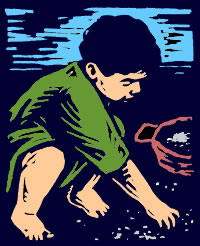
18th Sunday in Ordinary Time Year B
In John’s Gospel, Jesus’ self-giving in the foot washing is the climax of the Last Supper narrative. This gospel presents the Eucharist in the long passage we continue to read in today’s liturgy. This instruction may well have existed as an independent meditation upon the Eucharist before it was incorporated into the fourth gospel. It will help us to appreciate this meditation if we understand the literary form in which it is written (midrash) - a form common at the time among Jewish scholars. This approach takes an incident or a text in the Scriptures, and uses it to interpret a later event or situation. This meditation on the Eucharist is developed in the form of a dialogue between Jesus and those he is leading to Eucharistic faith. The framework adopted is the story recalled in the first reading – God’s people being led by Moses through the desert. They are rebellious, even though God is providing them with food and drink. Like the old people, those who are interrogating Jesus in this meditation are given to doubting and complaining – they too find it difficult to accept what God is offering them.
What Jesus has to give is immeasurably greater than the earthly nourishment of the old story. It is only through faith that the hearers of Jesus can possess what he is offering them. In today’s passage, therefore, Jesus is encouraging his hearers to find the faith they will need if they are to recognise ‘the bread from heaven’ that his Father is offering them. We too should take his teaching to heart, as his disciples,
Jesus urges his hearers – impressed by his feeding of the crowd – to look beyond earthly things: ‘You had all the bread you wanted … do not work for food that can not last’. They have failed, he tells them, to recognise that the feeding of the crowd was a ‘sign’, pointing to another nourishment that ‘the Son of Man is offering’. The tragedy of the old people’s history was that they did not find the deep faith and trust God’s caring for them should have brought; those listening to Jesus are in the same situation – Jesus urges them to recognise that his ‘Father’ is now giving (note the present tense) them ‘bread from heaven … the true bread’ that ‘gives life to the world’. His listeners echo the desires and yearnings of humanity down through the ages, for the fullness of life: ‘Give us that bread always’. ‘I AM the bread of life’, Jesus declares. If they ‘believe’, he tells them – if they have the faith that is able to recognise what God is offering them – he will be their nourishment for eternal life.
There is still no direct reference to the Eucharist. When it is made in next week’s reading, the Eucharist will be seen as the ultimate expression of all that the Saviour has become for us in his Paschal Mystery.
Disciples of the Lord, if they have genuine faith, must learn from the example of Jesus. The reading from Ephesians tells us that our faith needs a healthy focus. The teaching of St Paul contrasts the emptiness of the ‘aimless kind of life’ that is ‘corrupted by illusory desires’ with ‘the way learnt from Christ … the new self created in God’s way’.
John Thornhill sm

